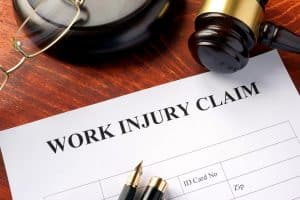Will My Second Job Affect My Workers’ Compensation Claim?
 If you got hurt on the job, talk to the Delaware workers’ compensation attorneys at Silverman, McDonald, & Friedman in Newark, Wilmington, and Seaford. It can be confusing to file a workers’ compensation claim in Delaware, so you should always seek experienced counsel.
If you got hurt on the job, talk to the Delaware workers’ compensation attorneys at Silverman, McDonald, & Friedman in Newark, Wilmington, and Seaford. It can be confusing to file a workers’ compensation claim in Delaware, so you should always seek experienced counsel.
When you get injured on the job in Delaware, you are entitled to receive workers’ compensation benefits. Determining how much money you will be able to take home can be tricky because it is calculated on a few factors, like how injured you are, how long you have been employed, and if you are a seasonal employee or not. What can make it even more confusing is if you work more than one job at the time of your injury. This is called “concurrent employment.”
As of January 2023, federal labor data reported that over 8 million Americans are currently working more than one job. With inflation surging, this certainly does not come as much of a surprise. But when you get hurt while working one of your jobs, how does that affect your compensation benefits?
First, what exactly does workers’ compensation cover?
All employers in Delaware are required to carry workers’ compensation if they have at least 1 or more employees. This will help cover expenses and loss of wages for employees who have experienced a work-related injury, disease, or death. Workers’ compensation is no-fault insurance, so the employee cannot be held liable for their injuries unless there was a clear disregard for safety. They also cannot be fired for getting hurt or filing a workers’ comp claim. This type of insurance will cover medical costs, like doctors visits, rehabilitation, and medication, as well as lost wages. The amount you receive will depend on the severity of your injury along with some other factors.
Depending on how serious your Delaware workplace injury was, you may qualify for:
- Partial disability – If you’re still able to work for your employer either by having fewer hours or moving to a different position.
- Total disability – If you’re not able to work at all, but are able to eventually return after healing.
- Permanent Social Security disability – If you are not able to ever return to work.
Can I still receive workers’ comp if I work two jobs?
Essentially, yes. You can still qualify for and receive workers’ compensation even if you work 2 jobs. However, there are some caveats to keep in mind. The state of Delaware determines the amount of money you will receive for workers’ compensation by average weekly wage (AWW). Depending on your injury, you will receive:
- Total disability – 66 2/3% of gross weekly wage
- Partial disability – 2/3 of the difference between pre-injury and post-injury wages
At the same time, both of your jobs are not able to be factored into your AWW. Only the job where you were injured will pay your workers’ compensation claim. Let’s dig deeper to understand that more.
If you can still work your second job
Imagine that your full time job is being a forklift operator. You got hurt on the job one day and broke your leg. Your employer does not have any other less strenuous positions for you to move to while you recover, so you want to file a workers’ compensation claim. However, you also work part time as a customer service representative remotely in the evenings. Since your broken leg does not affect being able to do your customer service job, you want to continue that while you’re out of work from your full time job.
The good news is, you are still allowed to receive your full workers’ compensation benefits even while continuing to work your part time job as normal. However, the income from your part time customer service job cannot be factored into your AWW since you were not injured while working that job. The workers’ comp wage-loss benefits can only be tied to the job in which you were injured at.
If you cannot work your second job
Now imagine that same scenario except your part time job is stocking store shelves at night rather than being a customer service rep. Now, you cannot physically perform either one of your jobs. Does that change your workers’ compensation claim?
Whether you are physically able to work your second job or not, this will not affect your claim. Since workers’ compensation will only cover medical costs and lost wages related to your full time job that you got hurt at, your part time job has no part in the claim. You will not be able to collect any benefits from your second job since you were not injured there.
If you decide to get a second job later
If you decide after filing your workers’ compensation claim that you would like to get a second job to help pay bills, you can do that. It just needs to be something that cannot contradict the reason for filing your claim at your other job. For example, you cannot file for workers’ comp after a broken leg and then take on a second job stocking shelves. But you can take a second job as a customer service rep.
And as you can imagine, that income cannot be factored into your AWW either. You are also required to tell your current employer about your new form of employment immediately. However, always talk to an experienced attorney before taking a second job while accepting workers’ compensation benefits to avoid any issues.
While you’re filling out your claim, be sure to always be truthful in that you do have two jobs. If you do not disclose this, you could commit fraud. And be sure that your employer is aware that you work two jobs as well. If it comes up as a surprise to them, your employer may come back and try to withdraw benefits or seek repayment due to your capability to work. At Silverman, McDonald, & Friedman, our Delaware workers’ compensation lawyers will help with the negotiations, claim process, and any appeals. Do not try to fight a battle like this on your own. We are skilled at presenting your claim and fighting for the compensation you rightfully deserve. To discuss your personalized workers’ compensation case, call our office, or submit our contact form to schedule a free consultation. We have offices in Wilmington, Newark, and Seaford.
Related Content:
- Repetitive Stress Injuries and Claims for Workers’ Compensation
- Workers’ Compensation for Police Officers, Firefighters, and Emergency Medical Services
- Delaware Health Agency Moves to a New Facility Because of Mold
- Common Workers’ Compensation Acronyms

Attorney Jeffrey S. Friedman joined Silverman, McDonald & Friedman in 2001. He graduated from Widener University School of Law, and is admitted to practice law in Delaware and Pennsylvania, and in several Federal Circuit courts. He areas of concentration include auto accident and workers’ compensation cases. Read more about Attorney Friedman here.

